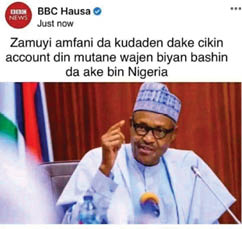Did Buhari say customers’ deposits will be used to repay loans?
A post has been trending on social media, especially Facebook, insinuating that President Muhammadu Buhari will utilise monies in customers’ bank accounts to repay Nigeria’s multilateral and local loans. The post, which is also circulating on WhatsApp, purportedly came from the Hausa service of the British Broadcasting Commission (BBC Hausa) verified handle on Facebook. The […]

A post has been trending on social media, especially Facebook, insinuating that President Muhammadu Buhari will utilise monies in customers’ bank accounts to repay Nigeria’s multilateral and local loans.
The post, which is also circulating on WhatsApp, purportedly came from the Hausa service of the British Broadcasting Commission (BBC Hausa) verified handle on Facebook.
The post, which was written in Hausa language reads, “Za muyi amfani da kudaden da ke cikin account din mutane wajen biyan bashi da ake bin Najeriya”.
A direct translation of the post is: “We will use monies in people’s bank accounts to pay the debts Nigeria is owing,”
Verification
In verifying the post, Daily Trust first tried to establish if the particular verified Facebook account actually belongs to the BBC Hausa Service.
Daily Trust subjected the account to verification and found out that it was doctored.
It was further observed that BBC Hausa has a unique style of embedding its quotes and attributions, which is missing in the alleged quote from President Buhari.
Subsequently, Daily Trust reached out to an official at the BBC Hausa Service who dismissed the post saying, “It did not emanate from the international media organization.”
Meanwhile, the Nigeria Deposit Insurance Corporation (NDIC) is charged with the responsibility of making sure that every deposit liability of every bank in Nigeria is insured and licensed.
Sections 16, and 20 of the NDIC Act ensure the safety of deposits and soundness of insured financial institutions provided they operate in the country.
Also, the corporation guarantees the payment of depositors in the banking sector.
Therefore, it is not possible for the federal government to take insured customers’ deposits from their bank accounts to pay loans.
Background
Nigeria’s debt stock rose to N44.06 trillion in September 2022 from N42.84 trillion in June, according to data from the Debt Management Office (DMO).
The total debt stock comprises of total domestic and external debt stocks of the federal government, state governments and the Federal Capital Territory.
The increase in the debt stock was largely due to new borrowings by the federal government to part-finance the deficit in the 2022 Appropriation Act, as well as, new borrowings by sub-nationals.
The DMO stated that total domestic stock stood at N26.92 trillion while the external stock was N17.15 trillion as of September 2022.
The DMO said the next administration will inherit a public debt of N77 trillion if the N23 trillion loans from the Central Bank of Nigeria (CBN) are securitised.
The Director-General of the DMO, Patience Oniha, stated this during the public presentation of the 2023 budget in Abuja recently.
Her announcement came on the heels of heated debates on the sustainability of Nigeria’s debt amid shrinking revenue and mounting CBN loans.
Daily Trust recalls that President Muhammadu Buhari requested a delayed approval for the N23.7 trillion loan that had already been spent, causing an uproar in the Senate.
The lawmakers rejected the request and accused the president of violating the constitution. They also demanded details of how the money was spent.
However, the minister of Finance, Budget and National Planning, Zainab Ahmed, said a committee has been set up by the Senate to interface with the ministry to provide further explanations.
She added that the federal government was optimistic that the National Assembly would approve the proposal to securitise the loans.
She added, however, that should the CBN loans be added to the debt profile, the nation’s debt portfolio would increase significantly.
This Fact Check is produced in partnership with the Centre for Democracy and Development (CDD)
